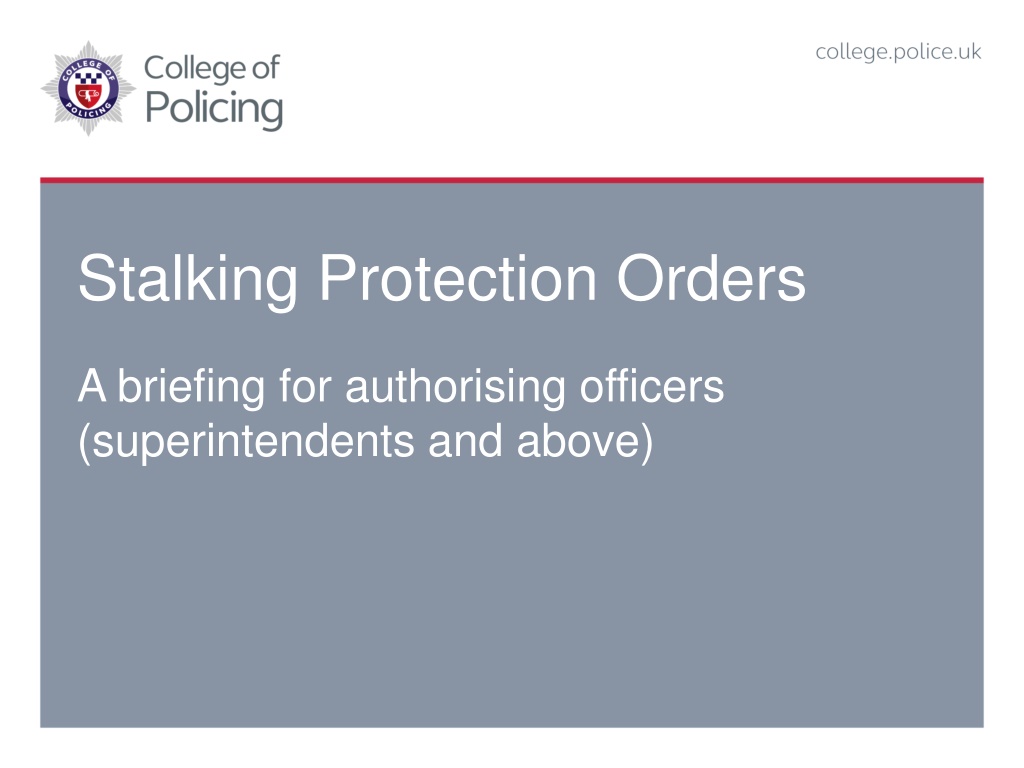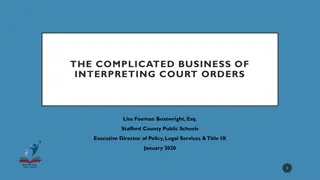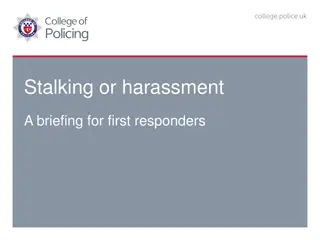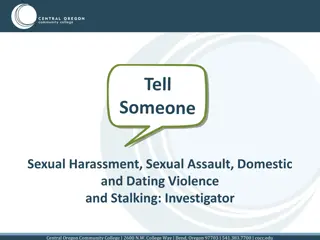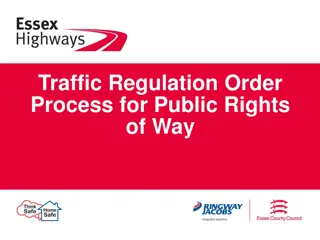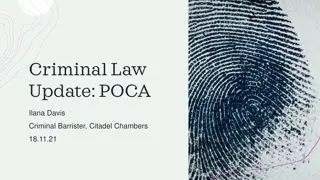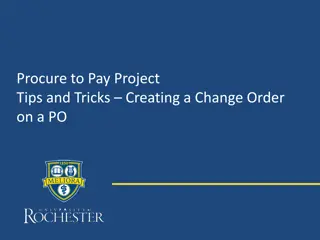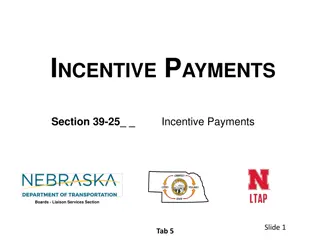Briefing on Stalking Protection Orders for Authorising Officers (Superintendents and Above)
The Stalking Protection Act 2019 introduces a civil Stalking Protection Order (SPO) for early police intervention to address stalking behaviors. Authorising officers must ensure orders are justified, necessary, and consider human rights. Stalking is defined by unwanted, fixated, and obsessive behavior causing fear or distress. Key responsibilities include applying criteria, conducting assessments, and completing necessary paperwork for SPO applications.
Download Presentation

Please find below an Image/Link to download the presentation.
The content on the website is provided AS IS for your information and personal use only. It may not be sold, licensed, or shared on other websites without obtaining consent from the author. Download presentation by click this link. If you encounter any issues during the download, it is possible that the publisher has removed the file from their server.
E N D
Presentation Transcript
Stalking Protection Orders A briefing for authorising officers (superintendents and above)
Background: The Stalking Protection Act 2019 received Royal Assent on 15 March 2019. The Act introduces a new civil Stalking Protection Order (SPO) which can be sought by the police. The new order closes a gap in the existing protective order regime. This Act has been created to enable early police intervention, pre-conviction, to address stalking behaviours before they become entrenched or escalate in severity, and to protect victims from more serious harm. The criminal threshold must be met for a full SPO to be made. However, the test to be applied for an interim SPO is lower and can be granted if the court considers it appropriate to do so .
Background: Where the criminal threshold has already been met, a relevant charge should be sought. A Stalking Protection Order should not be seen as an alternative to prosecution for stalking offences under the Protection from Harassment Act 1997. However, an SPO can be applied for even if a prosecution is not pursued. A Stalking Protection Order can be used to complement a prosecution of a stalking offence. Statutory guidance for England and Wales has been issued under Section 12 of the Stalking Protection Act. The use of Stalking Protection Orders should be considered as part of local adult and/or child safeguarding and public protection procedures. An application for an order is made by the police by way of complaint to a magistrates court (crown court in the case of an appeal application).
Key responsibilities for authorising officers (AOs): An application for an order must be authorised by an officer not below the rank of superintendent. An application may be for an interim and/or full SPO or a variation, renewal, discharge or appeal (an appeal application would normally be considered on a case-by-case basis, with advice from a force solicitor). Applying the criteria for when to authorise an application for an order. Ensuring a stalking screening assessment has been conducted. Completion of relevant authorisation form to make an application for an order. Ensuring an application is justifiable, proportionate, necessary, and considers the human rights of all parties in the case.
Define stalking Stalking behaviours suggest greater risk of harm and require greater consideration of risk management. Consider if this case meets the description of stalking: In cases of stalking, there is a pattern of unwanted, fixated and obsessive behaviour which is intrusive. It can include harassment that amounts to stalking, or stalking that causes fear of violence or serious alarm or distress. Stalking will often focus on a person, whereas harassment will often focus on disputes. Is there evidence to suggest that if the problem was resolved, the behaviour will stop?
Identify stalking Consider the stalking acronym FOUR. Are the behaviours? Fixated Obsessive Unwanted Repeated Once the nature of the incident(s)/crime(s) is understood, determine whether a Stalking Protection Order is required to manage the risk of harm.
Applying the criteria for when to authorise an application for an order: You must have reasonable grounds for believing that the respondent: 1. 2. 3. has carried out acts associated with stalking poses a risk of stalking to a person, and there is reasonable cause to believe the proposed order is necessary to protect the other person from that risk. (The person to be protected does not have to have been the victim of the acts mentioned above.) A magistrates court may make an order only when satisfied that all three of the above conditions are met. The police should consider reasonableness when considering whether to apply for an order, taking into account the circumstances of the matter and background to the behaviour. The police should ensure that the victim reasonably finds the behaviour unwelcome, that the respondent ought reasonably to have known that, and that the behaviour can reasonably be regarded as posing a risk to the victim.
Key considerations for AOs: Understand the victim s view, particularly their view about changing risk. Understand that victims may not be fully aware that all the behaviour they have been subject to may be stalking behaviour. Establish the views of the person(s) (including their willingness to support the application) for whose protection the SPO would be issued. The motivation of the suspect, and the context and effect of the behaviour on the victim are important factors to understand. The AO may authorise the application for an SPO in circumstances where the person for whose protection it is intended does not consent to the application for an order.
